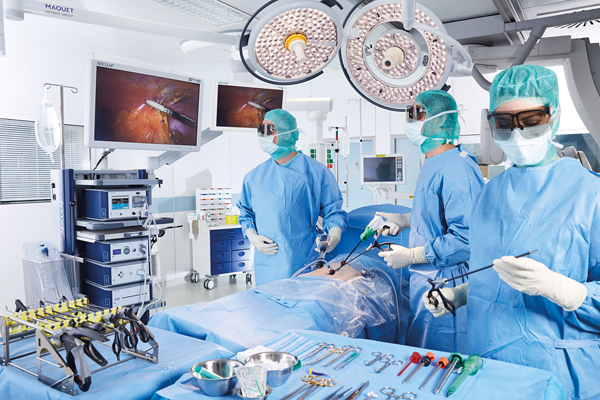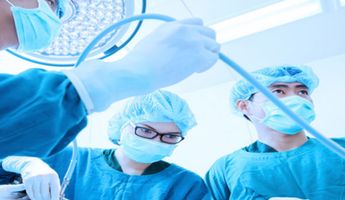Laparoscopy in France
Find the best clinics for Laparoscopy in France
No pricing info available
Germany offers the best prices Worldwide
Price: $ 586
From 161 verified reviews
latifa Rabhi, 06 September 2020
Very fast support, with highly qualified and human staff.The rooms are beautiful and very quiet.Calm and gentleness in this hospital, I highly recommend.
WHY US?
At Medijump, we're making medical easy. You can search, compare, discuss, and book your medical all in one place. We open the door to the best medical providers worldwide, saving you time and energy along the way, and it's all for FREE, no hidden fees, and no price markups guaranteed. So what are you waiting for?

Free

Best Price

Widest Selection

Risk-Free
What you need to know about Laparoscopy in France

Laparoscopy is a type of surgery that allows surgeons to access the inside of the abdomen and pelvis with only small incisions. Also known as minimally invasive or keyhole surgery, laparoscopy is less painful than traditional open surgery. Other benefits of this type of surgery include less bleeding, reduced scarring, and a faster recovery period.
What does a Laparoscopy Procedure Involve?
Laparoscopy is performed under general anesthetic. During the surgery, your surgeon makes small incisions in your abdomen to insert an instrument called a laparoscope, small surgical tools, as well as a tube to pump gas into the abdomen. A laparoscope is a small tube with a camera and a light attached to its end and the camera sends images of the inside of the abdomen to a monitor.
How Long Should I Stay in France for a Laparoscopy Procedure?
You may be able to go back to your hotel immediately after a laparoscopy, but in some cases, you may need to stay for at least 1 to 2 days. You may be able to fly back home within 3 to 7 days after the surgery. During your stay, you will have to attend hospital check-ups and to rest.
What's the Recovery Time for Laparoscopy Procedures in France?
The recovery period for laparoscopic surgery depends on the type of treatment. However, the overall recovery period is shorter than the traditional surgery. For example, the total recovery period for intestinal surgery with traditional methods may take 4 to 8 weeks, but with laparoscopic surgery, you only need 2 to 3 weeks to recover and return to work.
What sort of Aftercare is Required for Laparoscopy Procedures in France?
The aftercare will be different from one person to another, depending on what type of condition the surgery is used for. Your surgeon will tell you how to keep your wounds clean, the diet you will need to follow, and the type of exercise you can do. You will likely have a follow-up check-up with your local doctor to monitor your condition.
What's the Success Rate of Laparoscopy Procedures in France?
Laparoscopy is known to have a high success rate. Serious side effects, risks, and complications are rare. Minor complications occur in 1 out of every 100 cases, while serious complications occur in 1 out of every 1,000 cases. The side effects and risks include infection, minor bleeding, damage to an organ, or damage to a major artery.
Are there Alternatives to Laparoscopy Procedures in France?
Laparoscopic surgery is an alternative to traditional open surgery. You can always undergo open surgery if you prefer to do so. There are also some treatment alternatives to laparoscopic surgery, but this depends on the condition you want to treat.
What Should You Expect Before and After the Procedure
Before a laparoscopy, you may have problems in your appendix, kidney, or other parts of your abdomen. After the surgery, these issues are treated and possibly resolved.
Whilst the information presented here has been accurately sourced and verified by a medical professional for its accuracy, it is still advised to consult with your doctor before pursuing a medical treatment at one of the listed medical providers
No Time?
Tell us what you're looking for and we'll reachout to the top clinics all at once
Enquire Now

Popular Procedures in France
Prices Start From $520

Recommended Medical Centers in France for Laparoscopy

- Interpreter services
- Translation service
- Religious facilities
- Medical records transfer
- Medical travel insurance
- Health insurance coordination
- TV in the room
- Safe in the room
- Phone in the room
- Private rooms for patients available

- Interpreter services
- Translation service
- Religious facilities
- Medical records transfer
- Medical travel insurance
- Health insurance coordination
- TV in the room
- Safe in the room
- Phone in the room
- Private rooms for patients available

- Interpreter services
- Translation service
- Religious facilities
- Medical records transfer
- Medical travel insurance
- Health insurance coordination
- TV in the room
- Safe in the room
- Phone in the room
- Private rooms for patients available

- Interpreter services
- Translation service
- Religious facilities
- Medical records transfer
- Medical travel insurance
- Health insurance coordination
- TV in the room
- Safe in the room
- Phone in the room
- Private rooms for patients available

- Interpreter services
- Translation service
- Religious facilities
- Medical records transfer
- Medical travel insurance
- Health insurance coordination
- TV in the room
- Safe in the room
- Phone in the room
- Private rooms for patients available

- Interpreter services
- Translation service
- Religious facilities
- Medical records transfer
- Medical travel insurance
- Health insurance coordination
- TV in the room
- Safe in the room
- Phone in the room
- Private rooms for patients available

- Interpreter services
- Translation service
- Religious facilities
- Medical records transfer
- Medical travel insurance
- Health insurance coordination
- TV in the room
- Safe in the room
- Phone in the room
- Private rooms for patients available

- Interpreter services
- Translation service
- Religious facilities
- Medical records transfer
- Medical travel insurance
- Health insurance coordination
- TV in the room
- Safe in the room
- Phone in the room
- Private rooms for patients available

- Interpreter services
- Translation service
- Religious facilities
- Medical records transfer
- Medical travel insurance
- Health insurance coordination
- TV in the room
- Safe in the room
- Phone in the room
- Private rooms for patients available

- Interpreter services
- Translation service
- Religious facilities
- Medical records transfer
- Medical travel insurance
- Health insurance coordination
- TV in the room
- Safe in the room
- Phone in the room
- Private rooms for patients available

